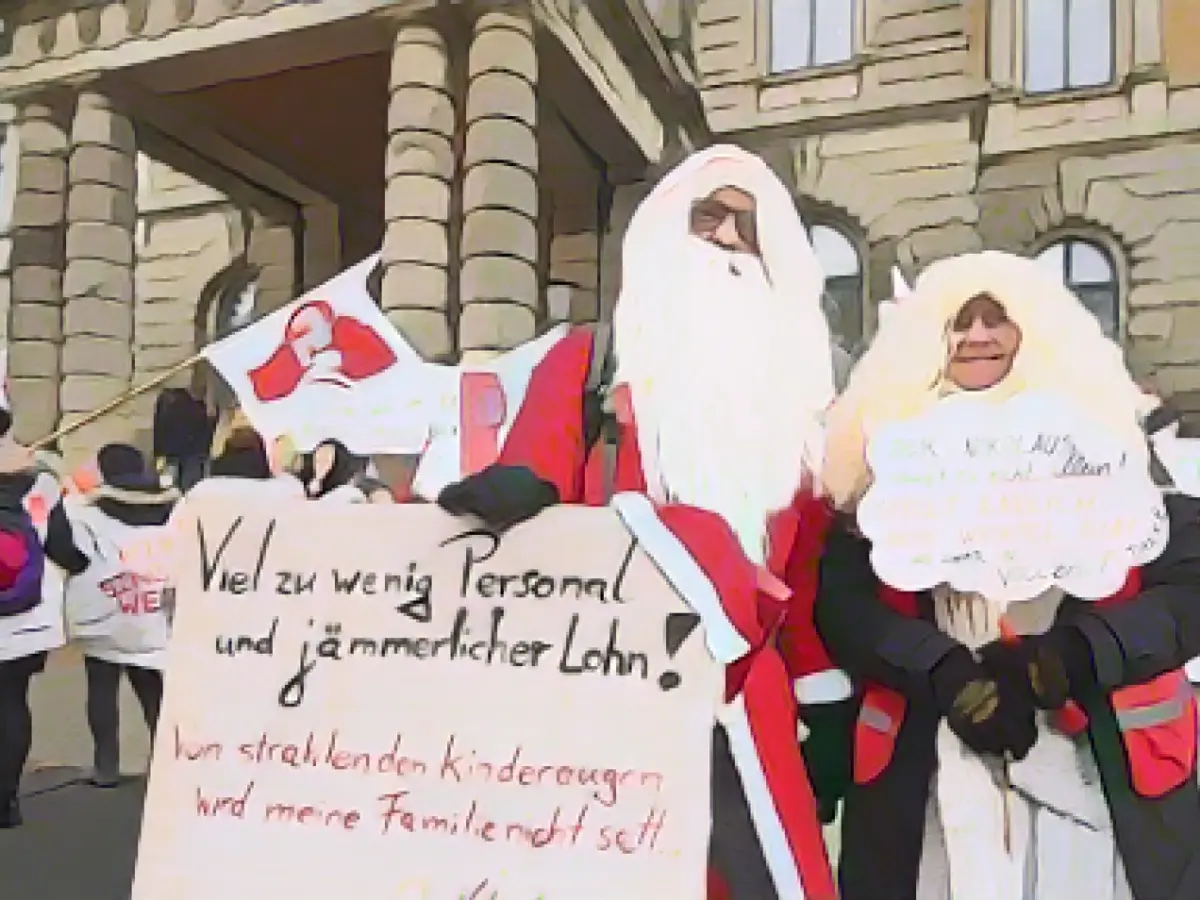Thousands of German Workers Strike and Protest for Wage Increases and Better Working Conditions
Thousands of employees across Germany are standing up for their rights as a potential turning point in the public sector wage dispute approaches. According to union reports, approximately 13,000 individuals participated in warning strikes in Berlin, resulting in the closure of schools and canceled classes. Protests took place in other cities as well, such as Dresden, Saxony-Anhalt, and Schleswig-Holstein, with thousands joining in the demonstrations.
In Dresden, public sector employees gathered in front of the Saxon Ministry of Finance, demanding higher salaries and improved working conditions. Teachers, university staff, and employees from Sachsenforst, among others, participated in the protest. Organizers estimated their number at 4,500. Similarly, around 3,200 employees in Schleswig-Holstein took to the streets, advocating for better wages.
Negotiations between unions and employers scheduled for Thursday in Potsdam could be a critical juncture in the dispute. Verdi and the dbb civil servants' association, representing approximately one million state employees with collective agreements, are seeking a 10.5% income increase and at least 500 euros more, impacting more than three million employees in total.
Additional Insights:
- The third and longest warning strike by Verdi at BVG is set to last for 48 hours, beginning at 3 AM on Thursday and extending until Saturday morning. Their demands include a €750 increase in the base salary with a 12-month contract, a shift allowance of €300 for driving personnel, and a doubling of shift premiums from €100 to €200. BVG initially offered a 17.6% increase spread over four years, but Verdi claims this would result in a real wage cut.
- Strikes have been called across multiple sectors, including municipal waste disposal services, water companies, swimming pool companies, and hospitals. Verdi has given BVG an ultimatum, threatening indefinite strikes after March 21 if demands are not met. Critics argue that the union's strategy lacks effectiveness and could be more impactful with broad, collective action.
- There is growing dissatisfaction within Verdi's ranks, with some members calling for more militant action and questioning the union's leadership. A group, the Transport Workers Action Committee, advocates for public negotiations and solidarity among all workers in the public sector.
- Germany is experiencing its largest social cutbacks since the postwar era, as the government pushes for rearmament and austerity measures. The election campaign is ongoing, and unions are cautious about organizing large-scale strikes that may jeopardize the government's efforts to secure a stable government through early elections.
Current Dispute Status
- Warning Strikes: Verdi and dbb have been conducting warning strikes across various sectors, including public transport, waste management, and healthcare. For instance, a 24-hour strike at Berlin's urban transit operator BVG brought bus, tram, and subway services to a near standstill on February 13, except for the S-Bahn.
- Negotiations: The unions are advocating for an 8% wage increase, with a minimum raise of 350 euros per month, as well as higher allowances for demanding roles and additional days off. However, employers have not yet presented a counteroffer, leading to concerns about the likelihood of reaching an agreement.
- Political Context: The negotiations are complicated by the upcoming federal elections, which may influence the government's willingness to make concessions. Federal Interior Minister Nancy Faeser has acknowledged financial constraints but indicated a possibility for a fair resolution based on the unions' requests.
Potential Outcomes
- Escalation of Strikes: If employers fail to present a counteroffer, the strikes could become more intense. Verdi's Deputy Chair, Christine Behle, has warned that significant strikes could emerge prior to the federal elections if no progress is made in negotiations.
- Impact on Cities and Sectors: The strikes could disrupt public services nationwide, affecting commuters, daycare centers, public transport, waste collection, healthcare workers, and airport ground staff. Previous localized strikes have already impacted regions like the Ruhr area, and larger, potentially nationwide strikes are now a possibility.
- Union Strategy: Verdi is attempting to manage the strikes in a way that prevents a broad, mass movement. However, there is growing discontent among union members, and some are advocating for a more unified and prolonged strike action to achieve better outcomes.
Additional Factors
- Public Support: The strikes have garnered support from various organizations, such as "Berlin Stands Together," which is backing the industrial action. Demonstrations have also been held in support of the strikes, although some have been called off due to security concerns.
- Internal Union Criticism: There is internal criticism within Verdi, with some members questioning the union's effectiveness in securing substantial wage increases. The Transport Workers Action Committee has called for more radical action, including public and livestreamed negotiations, and the formation of action committees to prepare for an all-out strike.








